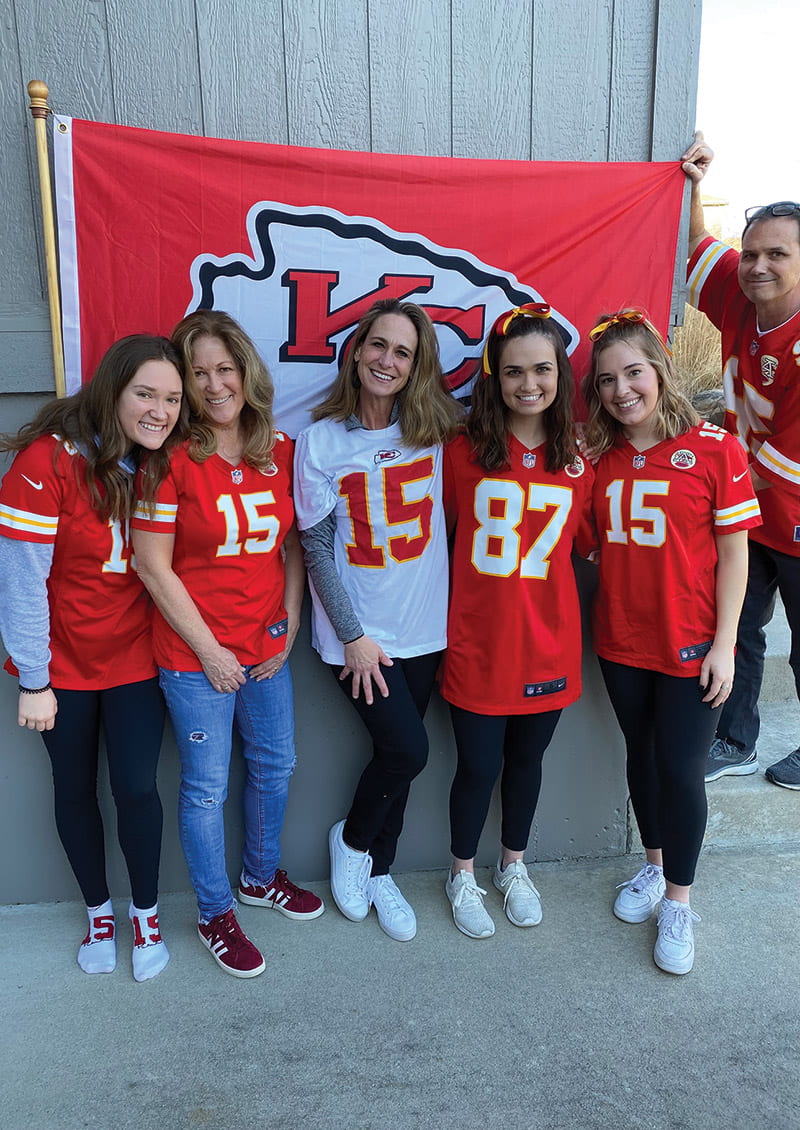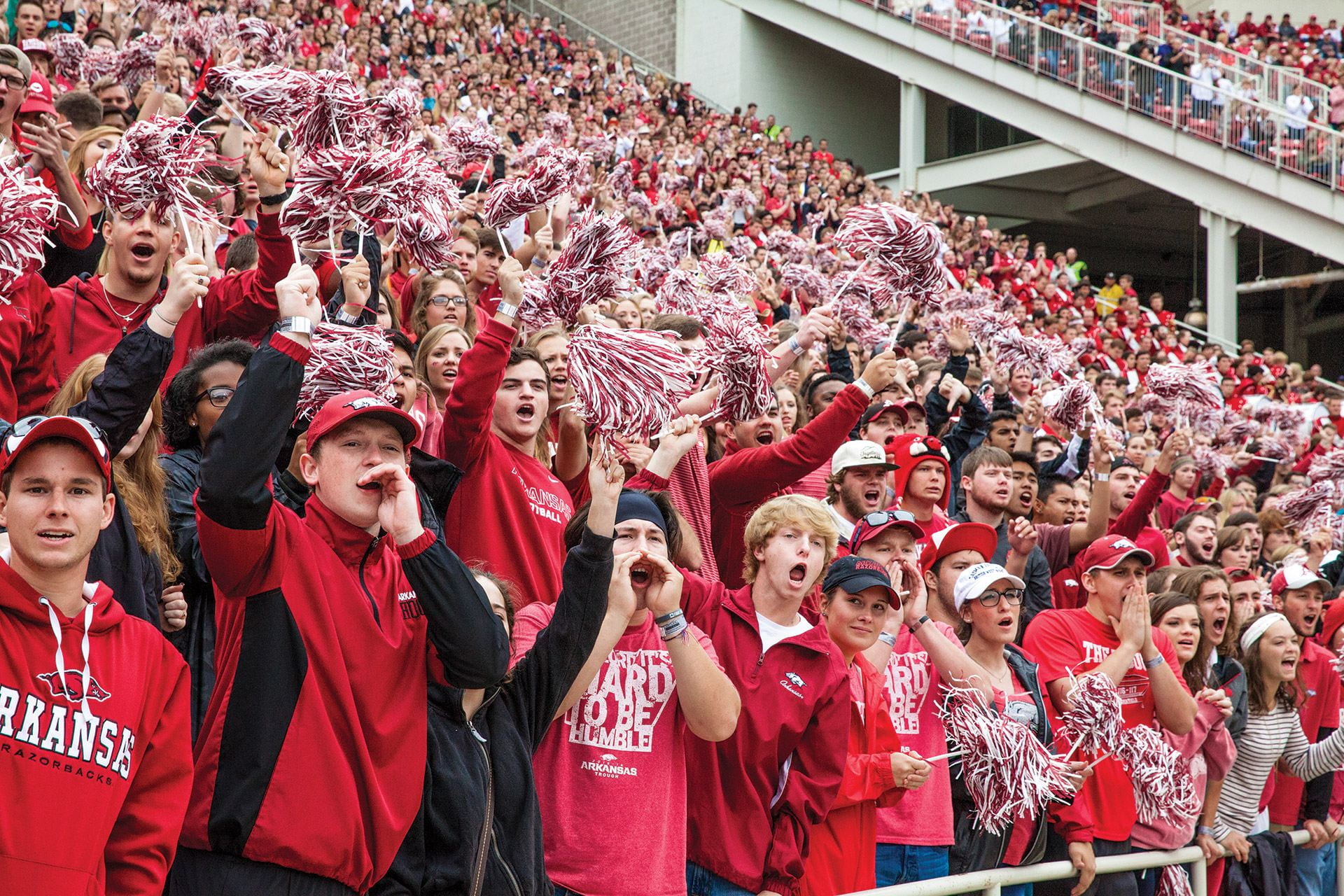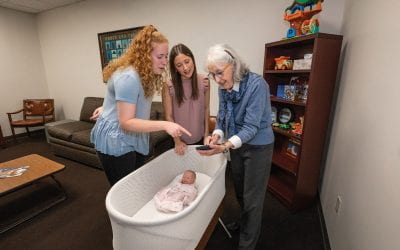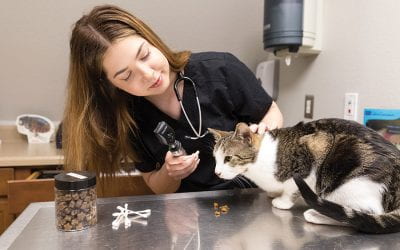By Katie Wilson Powell
The average American consumer can instantly connect with logos like the Nike swoosh or the Mac Apple without needing the name of the company to identify the brand. Megabrands such as Apple and Nike, though primarily meant to provide products to consumers, have, for many, evolved into something much more. “Identity loyalty,” said Madeline Braun, marketing and supply chain major from Kansas City, Missouri, “is when a customer is able to see a particular brand as part of who they are.” Sports fans, she posits, have identity loyalty on steroids.
“Sports fans will do anything — sit in the freezing rain, travel to cities, get in fights with people,” she said, adding, “No one feels identity loyalty like a sports fan.”
But how do sports teams spark such intense loyalty? For her honors thesis, Braun explored how the Kansas City Chiefs and the Razorbacks cultivate identity loyalty within their own brands. To find the secret sauce, she distributed a survey asking both Chiefs and Razorbacks devotees to answer questions about their sense of pride and loyalty in their team.
“We know a consumer has crossed into identity loyalty when everyone knows that they support that brand,” says Braun, and this proved critical to her success in distributing her survey to more than 200 fans. Braun’s network of parents and peers connected her to all sorts of followers — from Facebook groups obsessing over Chiefs players’ fashion choices to Instagram stories that reveal the person behind the uniform. “There’s more to a team than just the player, the jersey, the helmet,” says Braun. “People want to see that player’s personality.”

Maddie Braun (#87) with friends and family after the Chiefs Super Bowl win in 2020.
Braun, who was born and raised a Chiefs fan and became a major Razorback supporter in college, found that “a true sense of emotional connection” is a huge part of fan loyalty. In her survey, she heard from many fans who connected their loyalty to important memories with family, critical games with friends and moments in which they truly felt a sense of brand identity. “Without stories like these, there would be no history and no meaning to the team,” says Braun. “Stories like these are what will keep the fanbase alive.”
In addition to emotional connection, Braun found that a value system was also important. “Another sign of identity loyalty is when someone stands by or defends a brand,” she said. In response to national conversations around name changes for stereotypical depictions of Native Americans (as is evidenced in the naming of the Chiefs) Braun asked how loyalty might be altered with a name change. Most Chiefs fans surveyed stated that their loyalty wouldn’t waiver at all. Instead, fans noted that their loyalty would be most affected by a change in cities.
Braun’s mentor, Molly Rapert, associate professor of marketing, affirmed the value of her work.
“The world of brand loyalty is a prime focus in business today,” Rapert said. “As companies compete for resources and customers, they long for customers who are loyal beyond reason, so Maddie’s research on sports fans and brand loyalty is relevant and timely.”
To compare the identity loyalty she found in sports fans to the customers of consumer goods companies, Braun looked at three different major brands — Nike, Apple and Patagonia — that foster a sense of identity loyalty among their customers. Ultimately, Braun feels that companies can learn a lot from the family legacy of sports teams in terms of building identity loyalty.
“If brands can find a way to connect customers to a personality, an identity instead of just a massive corporation, they can show that brands are made of people and help people connect to those brands,” says Braun. “We grow up with our sports teams, and they are embedded in us from birth, but the same is true of many of the brands we grow to be loyal to as adults.” Many children, for instance, are handed an Apple iPhone at an early age and learn how to navigate it to entertain themselves. College students search store shelves for the detergent that smells like the clothes washed at home. “Brands need to find a way to reach children, reach parents, and develop the brand loyalty based on what they grew up with,” says Braun, “People will form identity loyalty by evolving with the brand.”
Braun received an Honors College Research Grant.

Arkansas Razorback fans cheering. Photo by John Baltz.
More Field Notes
Daylighting Hot Springs
When Zane Colvin moved from rural Wynne to bustling Hot Springs, he was wowed by the urban energy of his new home, but curious about the hot springs — where were they? Check out his bold proposal for Arkansas’ top tourist attraction.
Colorblind Quadrilles? A Closer Look at Bridgerton
For her honors thesis, senior political science major Daniella Ruiz Cantú knew that she wanted to combine her studies in both sociology and political science with her interest in film. She was confused why, despite numerous successful films featuring people of color front and center — like Coco and Crazy Rich Asians — she continued to encounter racism in the news and in person. After taking Lisa Corrigan’s honors colloquium in communications, she learned of one possible explanation: the reinforcement of the white gaze in media.
A New Angle On Climate Change
Dawson Oakley, a biological engineering senior, Honors College Fellow and hobbyist videographer with a passion for the outdoors and sustainability, decided to merge his interests by developing a video that raises awareness about climate change issues and showcases how engineering is being used to mitigate them.
Up All Night? Enter A.I.
Gabrielle Krupa, a senior communications sciences and disorders major, and Sutton Bauman, a senior communications sciences and disorders major with a background in human development, set out to explore how new technologies impact how parents bond with their newborn children.
Pandemic Pet Care
Animal science majors Kayla DeSmet and Sabrina Cox labored in the trenches throughout the pandemic — DeSmet working at a hospital for small and exotic animals in Fayetteville, while Cox learned the ropes at a Tontitown clinic that cares for pets and livestock. For their honors thesis research, they decided to document COVID-19’s day-to-day and long-term impacts on the companion animal industry from 2020 to 2021.






